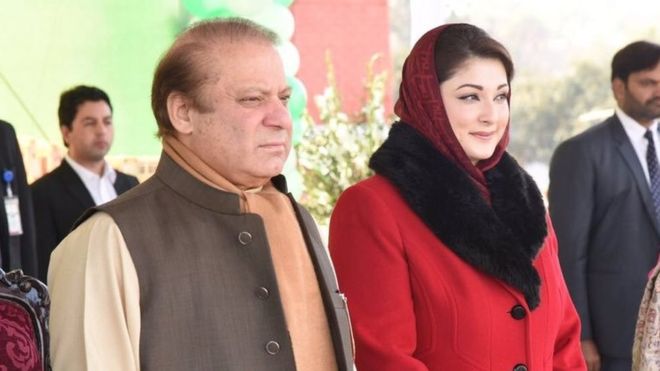Understanding The Corruption Case Currently Gripping Pakistan
THE CITIZEN BUREAU
NEW DELHI: Pakistan is in the middle of a heated political controversy, with Prime Minister Nawaz Sharif under intense pressure from the political opposition and sections of the media to resign from his post. The uproar follows a damning report by a court-appointed Joint Investigative Team that looked into allegations that the Sharif family owns expensive residential properties in London through offshore companies.
The information surfaced last year in the Panama Papers leak, prompting major protests by the opposition in Pakistan. At the time, a five-member court in Pakistan allowed Sharif to remain in office, but ordered an investigation into the allegations. Two dissenting judges, however, asked for Sharif’s disqualification. One judge went as far as equating Sharif to a “godfather” of an Italian-style mafia.
The JIT -- composed of civil and military officials -- submitted its report in the last week and concluded that Sharif and his two sons and daughter had not been truthful about their offshore wealth. In the report, the investigators said that Pakistan’s first family were guilty of living beyond their means, hiding their assets, perjury and even fogery.
As the Supreme Court reconvenes on Monday, the protests against Sharif are heating up. Foremost amongst his critics is Imran Khan, who leads the Pakistan Tehreek-e-Insaf (PTI). Khan has been a vocal critic of Sharif and has been campaigning against the latter for years. As a result of the investigation, Khan is calling for Sharif to step down and is demanding fresh elections.
The main opposition party, the Pakistan People’s Party (PPP), has also demanded that Sharif resign immediately. The PPP is calling for Sharif’s Pakistan Muslim League - Nawaz (PML-N) to replace Sharif with a new Prime Minister till fresh elections can be held.
Sharif, on his part, is standing firm. He has denied the charges against him, and as of now -- at least publicly -- his party seems to be backing him. “The report is a pack of lies,” Sharif said, following the conclusion of the JIT investigation. Sharif claims that the report looks at his family’s decades-old private businesses, and makes allegations without any proof of financial scandal or corruption in his current or past tenures. The Panama Papers, which were the trigger for the investigation, did not directly name Sharif -- but instead his two sons and daughter. The investigation is particularly damaging for Sharif’s daughter, Maryam Nawaz Sharif, who is seen as his political heir.
Adding fuel to the fire is a controversy centred on a Microsoft Font. Dubbed #FontGate, the controversy is based on a trust deed submitted by Maryam Sharif to authorities. The 2006 document claims that she was only a trustee and not owner of two offshore companies that bought the apartments. Investigators, however, say it was typed in Calibri font, which was not commercially available to the public until 2007, thereby leading to allegations that the deed was forged. Investigators also believe that a letter sent by a Qatari royal whose family had been a business partner of Nawaz Sharif’s father is fake.
On Monday, the Supreme Court could order the opening of a criminal investigation against the Prime Minister and his children, based on the JIT report. The above is a huge cause of celebration for the opposition. “Now, there will be criminal proceedings against the prime minister,” Imran Khan has been quoted as saying. “The whole family has lied to the court. The whole defense has been a fraud.”
Others, however, believe that the political upheaval is likely to continue, predicting instead a bitter legal battle ahead. As Zafarullah Khan, the minister of state for law and justice and a top aide to Sharif, said in an interview: “There is no precedent of the court using Article 62 and 63… If a new history is to be made, I cannot say, but there is not a single precedent.” Zafarullah Khan added that Sharif’s legal team will be challenging the findings of the JIT report. “The so-called evidences gathered by the investigative team are based on ‘sourced reports’ and don’t have evidentiary value,” he was quoted as saying.
As is typical in Pakistan every time the country faces a political crises, allegations of a conspiracy are already doing the rounds. Sharif himself has alleged that he is the victim of a conspiracy to dislodge him, with PML-N members and supporters hinting at army intervention. Some have gone as far as to allege, in veiled terms, that Pakistan’s intelligence agency -- the Inter-Services Intelligence (ISI) -- provided the JIT with investigation against the ruling family.
Pakistan as a country has seen a number of army-led coups, with Sharif himself being the target of a coup when General Musharraf ousted his second government in 1999. Sharif returned to Pakistan after several years in exile in Saudi Arabia, branding himself as a victim of the army’s high-handedness and intervention in democratic processes. After winning the elections again in 2013, Sharif sought to reach out to the army, although it is believed that despite his efforts, the civilian government and the military in Pakistan do not share a particularly close relationship. Nevertheless, Sharif will have a hard time convincing the public of an army-backed conspiracy, as he himself chose the current army and intelligence chiefs.
As the political drama plays out, the only certainty is the unlikeliness of a simple conclusion. As Sharif stands firm and his party says they are behind him, the number of back to back emergency meetings being calling in the corridors of power in Islamabad are more reflective of the troubled reality.





